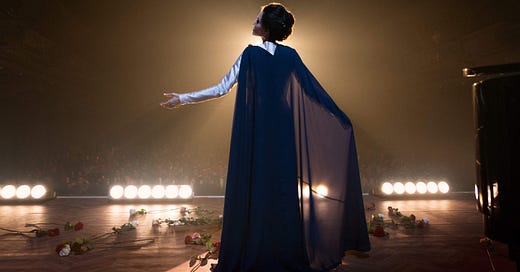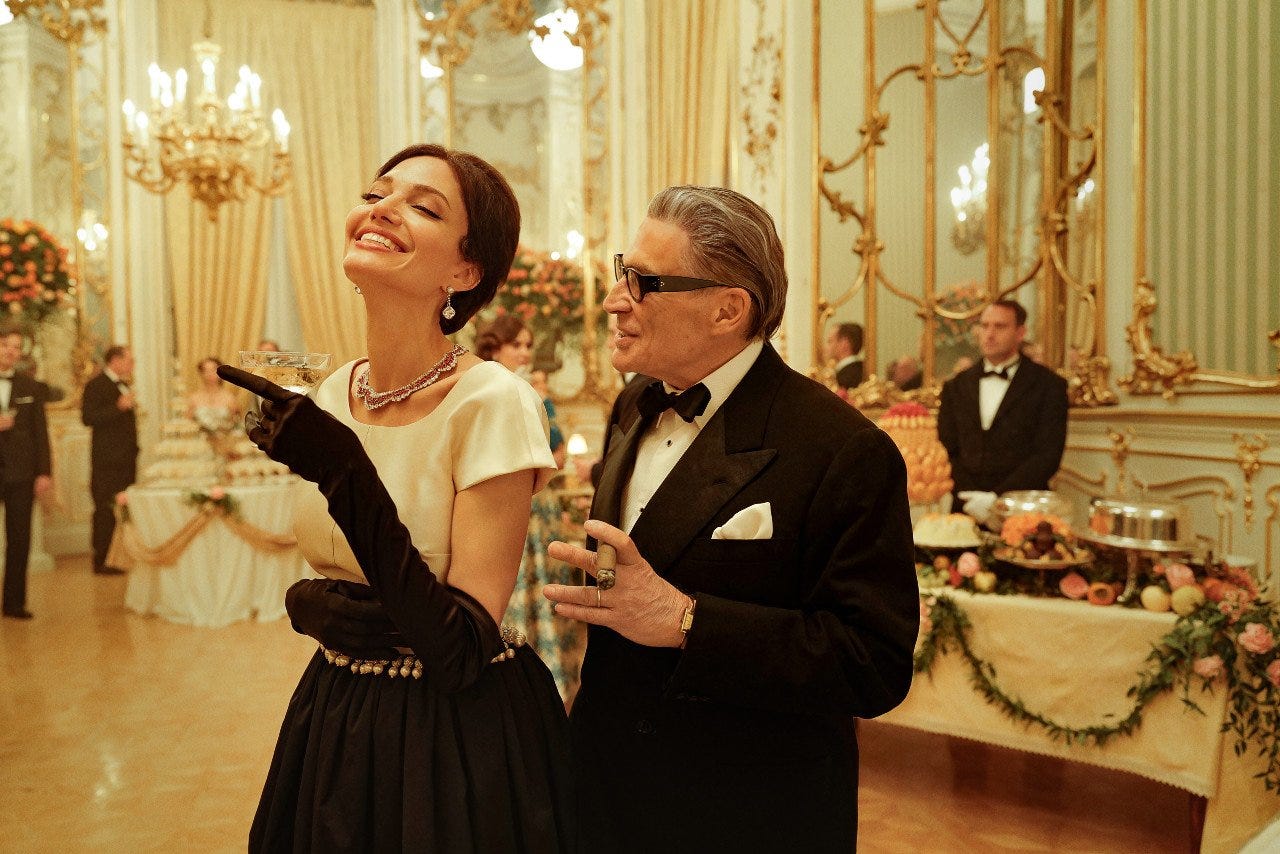Maria (2024)
In theaters. Begins streaming on Netflix on Wednesday, December 11.
Is this the story of a woman or her voice? Maria Callas (1923-1977) was a great operatic soprano, whose career encompassed decades and continents, hallowed concert halls and storied recording sessions, soaring professional triumphs and scarring personal pain.
Chronicling all that would be too massive an undertaking for a two-hour movie, so director Pablo Larrain and screenwriter Steven Knight have daringly hedged the risks.
They’ve put Callas and her fabled voice in fatal jeopardy right beside one another, just before being silenced in the last week of the great diva’s life.
Yet in September of 1977 she’s only 53, and Angelina Jolie in the role proves spectacularly supple, sleek and scrappy.
Callas was overweight early in her career. Her rigorous regimen in her early 20s to lose weight (taking off 80 pounds, which she never gained back) sharpened her onstage profile and extended her vocal pliancy.
Prodigies aren’t always known for their discipline, and Callas’ grit became part of her legend, but here we learn that she now barely eats and has grown, says her doctor, “too thin”. Jolie’s willowy yet fierce stance and stride show us a woman battling decline to the very end.
Callas still radiates glamour (the elegant costumes are by Massimo Cantini Parrini), and an edgy star’s temperament still rings in her imperious words. Almost everything she says feels like a command, not just to be obeyed but to be understood. She’s pushing back against time, and time seems to be winning.
Well, “exacting a price” may be a better way to describe what time and fate are dishing out.
Her suffering means that reality and illusion are colliding. In her enormous, gilded Paris apartment she glides from room to room, sleeping at all hours, refusing to eat, popping an array of pills to moderate her moods, appetite and real or fancied bodily distress.
She’s dutifully, anxiously attended by her butler Ferruccio (Pierfrancesco Favino) and housekeeper Bruna (Alba Rohrwacher), who’ve been with her for years.
They realize all is not right with the mistress of the house. She daily demands they move an enormous grand piano from one room to another, on her whim, never settling on which spot for the instrument is “better”. She asks Bruna to prepare meals she doesn’t finish.
She demands Ferruccio place in her hand medications she’s already taken, some of which her physician (Vincent Macaigne) has ordered her to stop. She hides capsules and tablets in pockets of her coats and dresses. She ignores the stark medical warning that intermingling pills overtaxes her liver and heart.
Callas can’t abandon her sense, not so much of privilege, but of heightened awareness. She must believe that her presence — everywhere — still matters. Medications seem to keep her thrumming, on her toes, protecting what’s left of her standing.
She instructs Ferruccio to make reservations at restaurants she has no intention of visiting and informs him of appointments she must keep when she actually walks the Paris streets alone – often unrecognized. In her imagination she transforms ordinary street bustle into a rousing chorus from one of her operas.
So jumbled are her impressions that cinematographer Ed Lachman often suspends his gorgeous tableaux, indoors and out, in arresting mid-distance, with the camera slowly, meditatively panning side to side. Or he gradually widens the lens to introduce figures we’re initially not sure are real or imagined.
One afternoon Callas announces to Ferruccio that a “television crew” will be coming to interview her, and shortly a journalist, Mandrax (Kodi Smit-McPhee), appears with cameraman and mobile TV camera in tow.
Mandrax (the name of one of Callas’ actual medications) proposes to capture the truth of Callas’ life in her own words and asks to converse with her at home and on her jaunts.
For the entire runtime Jolie stays in pitched, radical sympathy with the jittery, self-interrogating woman. The actress is so all-in that the achievements of a major artist indeed come to seem fragile, evanescent, teetering in the balance.
Her hesitation feels both understandable and fabricated; we wonder if this “arrangement” isn’t yet another self-projected fantasy. The script leaves us free to guess for ourselves.
The “interviewing” exposes the singer’s tenuous hold on reality, and it prods Callas to open up about her life’s turbulent narratives, the rough with the smooth.
But can Callas, recalling her slowly receding triumphs, still believe in her own grandeur? Do reminiscences of her sublime artistry help sustain her, or do they overwhelm her with doubt and regret?
She was married for years to the beneficent Giovanni Menenghini, but she quietly, calmly divorced him and we see her take up with the love of her life, Aristotle Onassis (Haluk Bilginer).
Maria exulting in the opulence she shared with the mesmerized Aristotle Onassis
Presenting himself as “ugly but rich”, the Greek shipping tycoon was enraptured by Callas, grandly courted her, and swept her into his luxurious lifestyle.
He actually wanted her to curtail her singing career, the better to stay close to him, yet never offered to marry her. Instead, without informing Callas, he courted and wed the widowed Jacqueline Kennedy, infuriating the diva. She never quite forgave him yet confesses she didn’t stop loving him.
The crucial test for Callas — whether she’ll embrace today’s reality or keep raking over the past — is posed by her inimitable voice, its lasting impression. She agrees to press what power she has left by appearing alone on stage with no one in attendance but an old friend, conductor Jeffrey Tate (Stephen Ashfield).
In an ornate, empty auditorium he plays piano as Callas, under a bright spotlight, recreates in a quavering yet still haunting voice some of her most triumphant arias. Is she good, really good? Tate devotedly says yes.
What we’re to conclude seems beside the point. To this day her most passionate admirers acknowledge they can’t quite comprehend the heights she scaled, or how far she fell from them.
What Callas believes her voice might still convey, the sublimity and radiance that once raised roofs, is what we’re left to sift through with her.
Jolie doesn’t stint in this last-ditch effort at glory. Callas’ reach for a long-ago vocal pinnacle is heart-rending to watch. But as we listen it’s clear that Larrain’s direction and Knight’s script brook no doubt: there’s fight in the aging prima donna yet.
But was she actually good at the end? Today those same admirers are still reluctant to render a definitive judgment.
With this movie Larrain has completed what he calls a triptych. Jackie (2016) portrayed the final reckoning of Jacqueline Kennedy Onassis (Natalie Portman) with the two overpowering men who tried to subsume her identity within theirs.
Spencer (2021) showed a rebellious, profoundly maternal Diana, Princess of Wales (Kristen Stewart) keeping the British monarchy at bay to preserve her bond with her two sons.
These women share with Callas a raging, indomitable focus, an inner tigress that refuses to be compromised by male privilege or summed up in pronouncements from the world at large. They furiously reject living on or being reduced to their “reputations”.
Jolie renders Callas with such a nuanced toughness that her evoking La Divina felt to me as though she might be guided by a force just out of reach, an inspiration that perhaps even she doesn’t fully comprehend.
For the entire runtime the actress stays in pitched, radical sympathy with the jittery, self-interrogating woman. The actress is so all-in that the achievements of a major artist indeed come to seem fragile, evanescent, teetering in the balance.
I’ve never seen Jolie more perplexingly lovely, in such exquisite jeopardy. She lets her poise and beauty tremble on screen, her eyes restless, her face frightened, near surrendering to, yet still raging against, the dying of the light.
I had no trouble imagining Callas herself, just off-camera, whispering gratefully: Brava, diva!






Can't wait to see this. Rejoining Netflix on Wednesday just to watch. Last time I "rejoined" was also for a musical icon - Maestro - and loved that. I guess my favorite types of movies are about musical legends - Bohemian Rhapsody too. A side note: when I worked as a chauffeur, I used to drive Jackie Onassis - and she was everyone's favorite at the limousine service.
What fascinating insights into the directors triptych. I’d never have thought to reflect upon the set of portrayals. Thank you as always for sharing your insights!